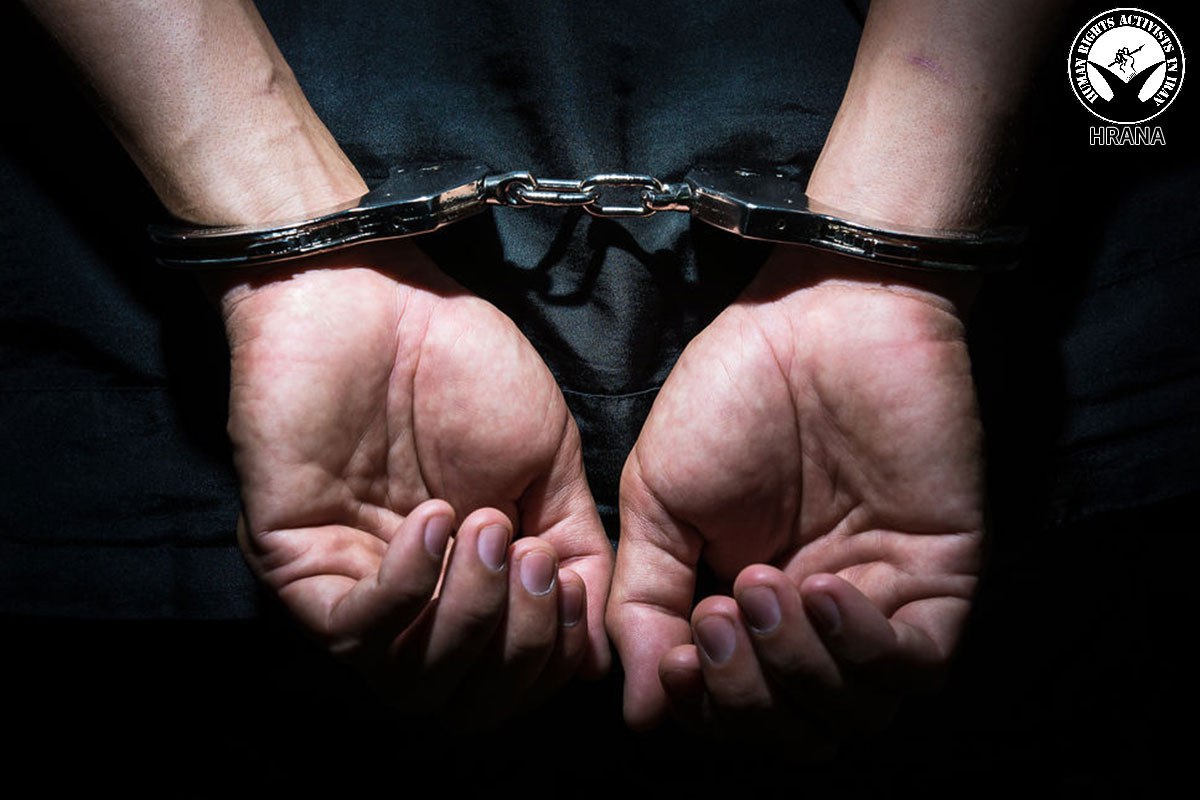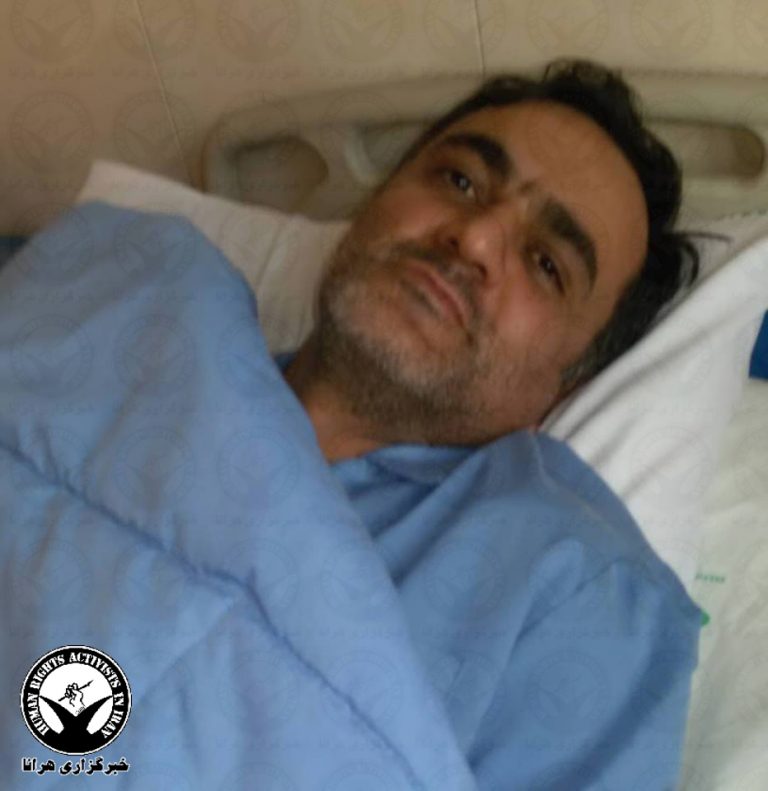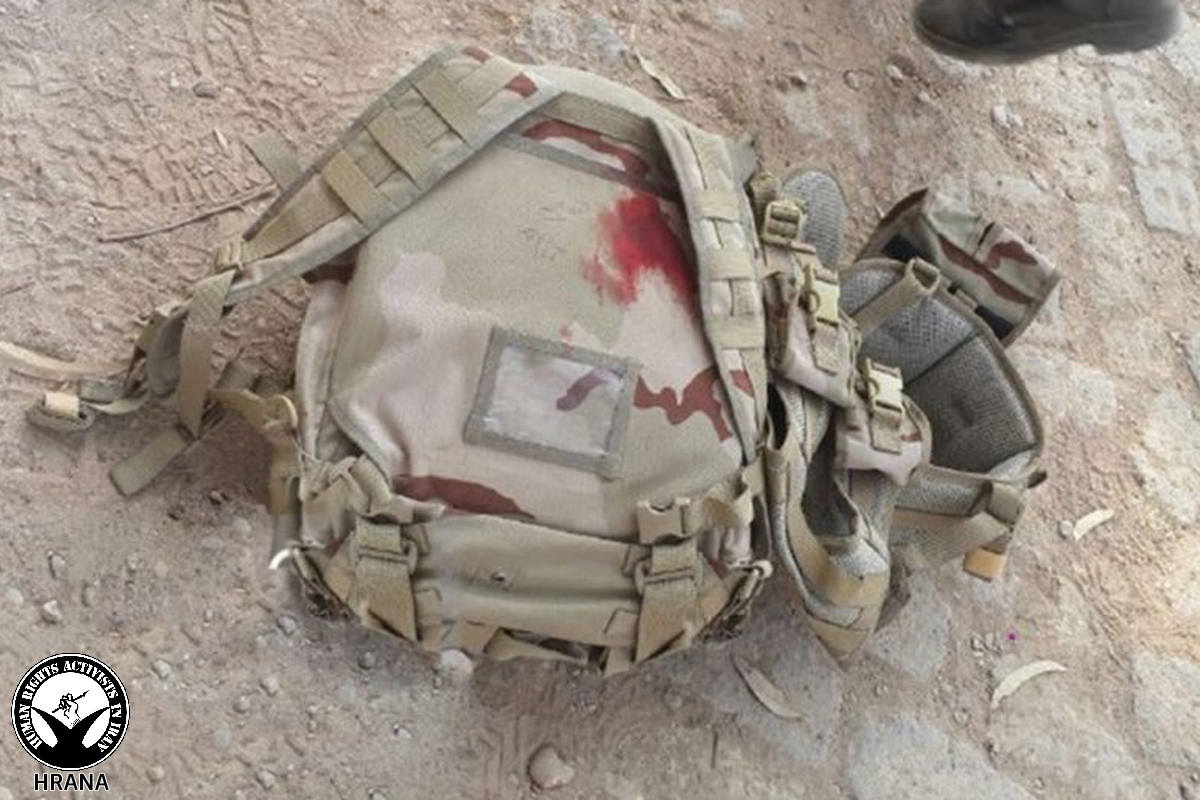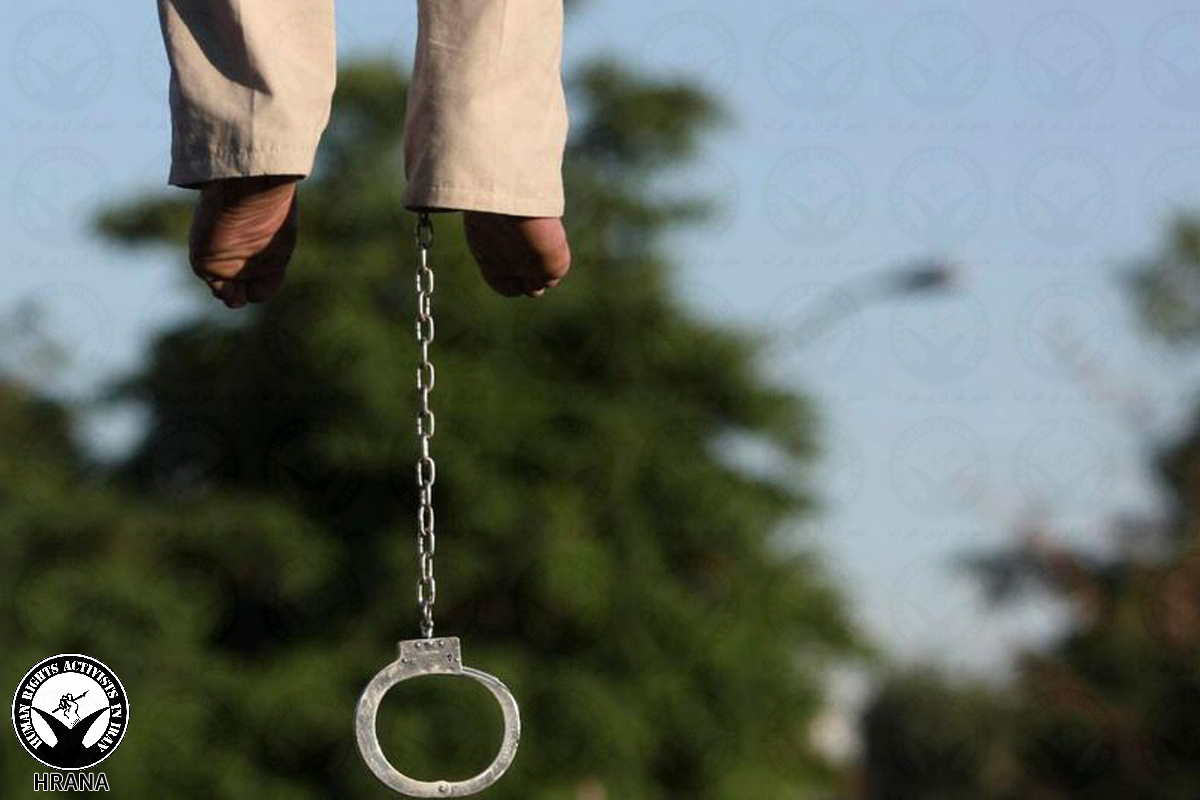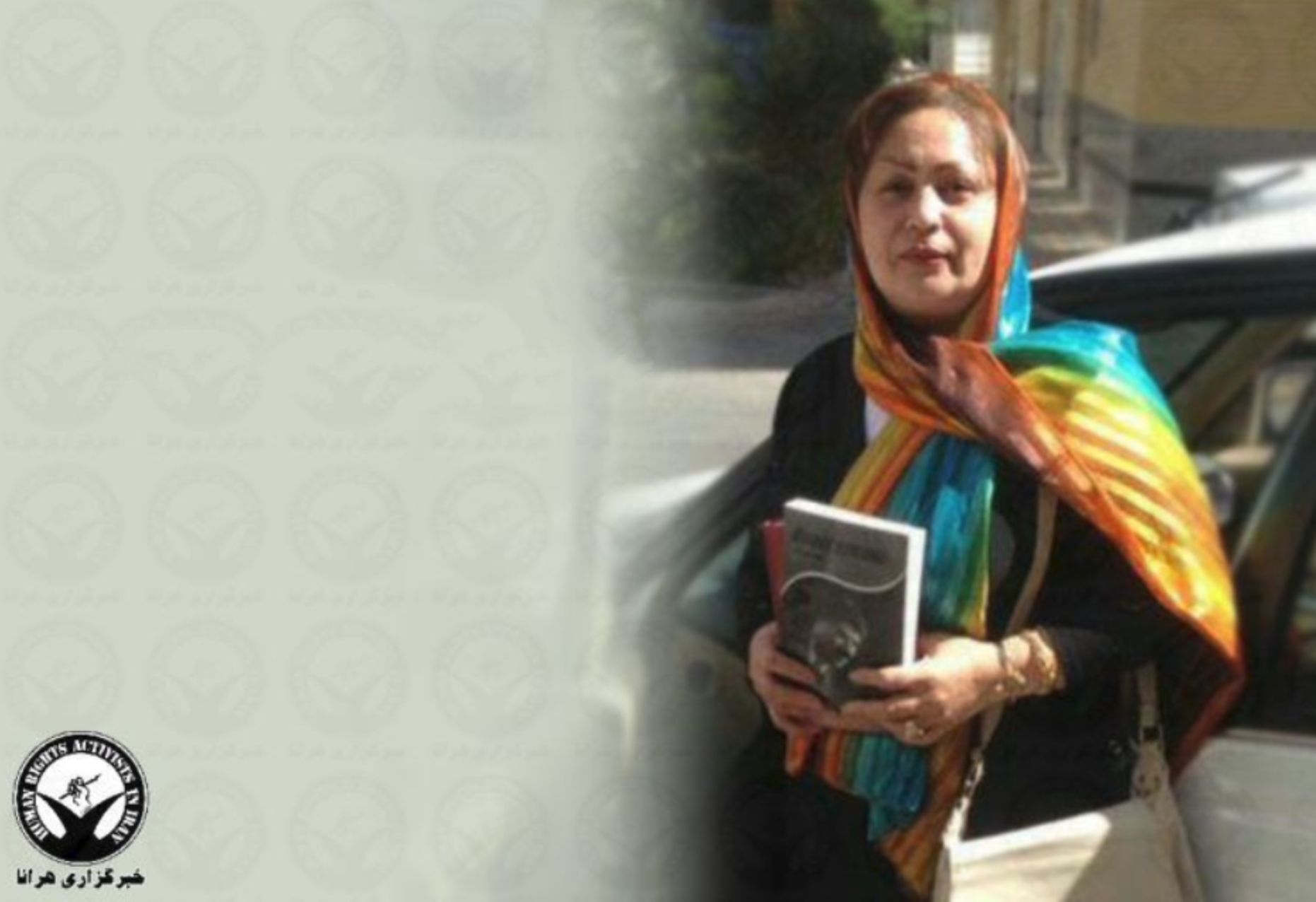Human Rights Activists News Agency (HRANA)- A prisoner in his eighth year of a 30-year sentence is in urgent need of medical care.
Evin prisoner Motaleb Ahmadian, 31, suffers from orchitis [infection and inflammation of the testes]. The infection recently spread to his bladder, a close source revealed, adding that the diagnosis was confirmed during ultrasonography tests Ahmadian underwent while on transfer to Telaghani hospital. His illness requires treatments that would drain excess fluid from the infection sites; uncontrolled, an infection of this type could lead to cancer. He is currently on the prison doctor’s waiting list for a medical transfer to undergo surgery, which he must pay out of his own pocket at an estimated 20 million tomans [approximately $1,500 USD].
Ahmadian was convicted on multiple counts: Moharebeh [enmity against God] through membership in a Kurdish opposition group; illegal entry into the country while armed and supporting a military group; and aiding and abetting murder. The charges stem from armed clashes in Saghez in 2010 that resulted in the death of a policeman and a civilian.
In August 2018, Branch 1 of Kurdistan provincial criminal court sentenced Ahmadian to eight years in prison for “aiding and abetting murder” and ordered him to pay half of the murder victims’ “blood money” [a designated sum owed to the families of homicide victims]. He was given an additional year and fined 20 million tomans [approximately $1,500] USD] on assault charges. Initially ordered to serve his sentence in exile in the southern city of Minab, he was instead transferred from Sanandaj to Tehran’s Evin Prison for reasons that were not disclosed.
Ahmadian, a Baneh native, was originally arrested October 5, 2010, after which he spent 230 days in solitary confinement. On May 3, 201,6 he was transferred to Saghez Prison after another prisoner made statements linking him to a weapon that was found there. This charge held water for some time, despite the material implausibility of smuggling a weapon from Sanandaj, where Ahmadian was held, to Saghez, more than 120 miles away. He was eventually acquitted and transferred back to Sanandaj.
Further back, Ahmadian was fined 100,000 tomans [approximately $300 USD] and sentenced to a year in prison for illegal border crossings in 2008 and 2011.
Saghez, Sanandaj, and Baneh are located in the province of Kurdistan on Iran’s border with Iraq. It is home to Iran’s Kurdish minority.
Author: admin-hr
Activist Maharam Kamrani Arrested in East Azerbaijan Province
Human Rights Activist News Agency (HRANA) – Azerbaijani activist and medical doctor Maharam Kamrani was arrested Thursday, October 25th at his workplace in East Azerbaijan Province’s Ahar county.
Kamrani’s medical practice was raided by security forces who seized his computer, laptop, books, and other personal belongings. He was then sent home under tight security controls and interrogated for three hours in front of his children.
Neighbors were reportedly assaulted when they protested the presence of plainclothes and security agents around the perimeter of Kamrani’s house.
After the interrogation, Kamrani was sent to an undisclosed location. His whereabouts and the charges against him have yet to be confirmed.
Kamrani was previously arrested for taking part in street protests against the TV show “Fetileh,” believed by many to have portrayed Azerbaijanis in a derogatory light.
Arrest Surge Continues in Khuzestan Province
Human Rights Activists News Agency (HRANA)- In the past few days, a number of Ahwazi Arab citizens in the cities of Ahvaz, Susangerd, Shushtar, and Shadegan were arrested by security forces and transferred to undisclosed locations.
They are presumed to have been swept up in an ongoing arrest campaign initiated by authorities after the September 22nd shooting on a military parade in Ahvaz. HRANA previously published a list of 133 detainees in its recent update on this arrest sweep through Khuzestan province.
The most recent arrestees were identified as follows:
1. Anvar Ashouri, age 26, resident of Beyt-e Ashur village in Shadegan County.
2. Hussein Hamoudi (Sobhani), age 25, arrested by the intelligence office of Ahvaz on October 22nd.
3. Yahya Baravieh, arrested in Ahvaz on October 23rd.
4. Naji Salimi (Ka’abi), resident of Beyt-e Mahmood village of Shush County.
5. Yahya Salimi (Ka’abi), resident of Beyt-e Mahmood village in Shush Province.
6. Azim Shaverdi, resident of Shadegan County.
7. Ibrahim Shaverdi, age 31, resident of Shadegan County.
8. Khaled Albou Khanfar, resident of Shadegan County.
9. Ahmad Shaverdi , age 24, resident of Shadegan County.
10. Mahdi Shaverdi, age 17, resident of Shadegan County.
11. Adnan Khanafere, resident of Shadegan County.
12. Moslem Farajollah, resident of Shushtar city, married father of one, arrested on October 24th.
13. Mohammad Reza Jalali, age 26, resident of Kuye Abouzar in Susangerd County.
14. Rahim Aminpour (Heydari), resident of Goldasht in Ahvaz, arrested on October 24th.
15. Muhammad Saydavi, age 26, resident of Susangerd County, arrested on October 25th.
16. Mostafa Jalali, age 29, resident of Susangerd County, mechanic and married father of one, arrested on October 25th.
17. Mahdi Abidavi, age 25, resident of Susangerd County, arrested on October 25th.
As of the date of this report, no further information is available on these arrestees’ locations or the charges against them.
Four Activists Arrested in East Azerbaijan Province
Human Rights Activists News Agency (HRANA)- Three Azerbaijani activists residing in Tabriz — Sajjad Afroozian, Ebrahim Ranjbar, and Sadollah Sasani — were arrested by security agents Friday, October 26th for participating in a memorial service for Gholamreza Amani. A fourth, Hakimeh Ahmadi, was arrested for undisclosed reasons in Marand.
Gholamreza Amani was a renowned Azerbaijani activist who died in a car accident along with his two brothers on October 23, 2008. Amid public suspicions around the circumstances of his death — believed by some to be a “premeditated murder” — security forces have kept an anxious eye and grip on the gatherings held in his memory.
A close source said security forces surrounded Maralan cemetery on Thursday, where Amani’s commemoration was scheduled to take place. Afroozian was among a number of activists contacted by security agents that day who threatened to detain them if they showed up.
Two of the arrested memorial attendees have been pursued by authorities in the past. Sasani was among a group of Azerbaijani activists arrested and interrogated in July 2017 during a gathering at Babak Fort. He was later released on a bail of 20 million tomans (approximately $5,000 USD). In one of his multiple run-ins with security agents and interrogators, Afroozian was violently apprehended in December 2016 in the city of Malekan and released the following February on a 50 million toman bond [approximately $12,000 USD].
Coinciding the three aforementioned arrests was the detainment of Hakimeh Ahmadi, arrested at her home in the city of Marand. Security agents reportedly roughhoused both her and husband, threatening them with a close-combat weapon. They offered no explanation for her arrest.
Ahmadi was previously arrested this past September and released on a 100 million toman bail [approximately $7,000 USD].
Afroozian, Ranjbar, Sasani, and Ahmadi have all been transferred to undisclosed locations.
Tabriz, Marand, and Malekan are located in the northeastern province of Azerbaijan, which borders the Republic of Azerbaijan and is home to Iran’s Azerbaijani minority.
Canadian Resident Saeed Malekpour Transferred to Hospital After Heart Attack
Human Rights Activist News Agency (HRANA) – Evin Prison approved the transfer of prisoner Saeed Malekpour to the cardiology department of Taleqani Hospital last week after he suffered from a heart attack.
A Canadian resident and alumna of the elite Sharif University in Tehran, Malekpour has a growing list of medical complaints that authorities have ignored over the course of 10 years of imprisonment. His requests for medical treatment and furlough have repeatedly been denied.
Now, photographs taken during his recent hospitalization show a worrying mass on Malekpour’s right knee, MRI results on which are pending. Malekpour has also developed kidney stones and prostate issues during his time behind bars.
With an arm and a leg uncomfortably restrained to the gurney, his sister Maryam told HRANA that Malekpour had trouble getting restorative sleep during his three-day stay. Sources indicate he was banned from hospital visits and subjected to mistreatment by security forces.
In 2008, the Cyber Unit of the Islamic Revolutionary Guard Corps (IRGC), accusing Malekpour of managing Persian-language pornographic websites, arrested him during a trip to Iran to see family. Branch 28 of Tehran’s Revolutionary Court sentenced him to death plus seven and a half years in prison, on counts of “propaganda against the regime,” “blasphemy,” “insulting the Supreme Leader,” “insulting the president,” “contacting opposition groups” and “corruption on earth.”
Malekpour’s death penalty sentence, though confirmed by the Supreme Court and sent to the Enforcement Department, was eventually reduced to a life sentence. Throughout his legal proceedings, Malekpour has insisted that case analysis by a computer and internet expert would absolve him of the aforementioned charges.
In a letter written from prison, Malekpour said he was previously isolated in solitary confinement for 320 days, during which time he was subject to torture, and given only a Qur’an, a Turbah [prayer clay tablet], and bottle of water.
Malekpour’s family has also borne the pain of his legal ordeal. Promising him that it would facilitate a bail release, authorities coerced Malekpour to provide a taped confession which was televised shortly after his father’s death in 2009. Malekpour learned of his father’s passing in a five-minute phone call 40 days after the fact.
Authorities Prevent Folk Author’s Remembrance Gathering for the 3rd Time
Human Rights Activists News Agency (HRANA) – Shahnaz Darabian’s plans to mark the one-year anniversary of her husband’s death at his resting place in Karaj’s Behesht-e Sakineh cemetery were abruptly derailed by a phone call October 24th, by which Iranian security forces informed her that the ceremony would not be permissible.
The widow and children of late writer Ali Ashraf Darvishian had announced their plans to commemorate his passing on October 23rd of this year.
“Security organs pled ‘anti-regime abuses’ to stop the event from taking place,” a close source told HRANA. “They have said that only family and close relatives of Mr. Darvishian are permitted to visit his grave for an hour. They left the family with no choice but to cancel the ceremony.”
The cancellation marks the third consecutive time that Iranian authorities have obstructed posthumous honors for Darvishian. Just two days after his death in 2017, Iranian authorities canceled a commemoration event planned for October 28th at Elmi Karbordi University. A second attempt to hold a ceremony was halted by security forces December 1, 2017.
Ali Ashraf Darvishian, a writer and scholar of folk literature, died of an illness on October 26, 2017, at the age of 76. He was buried October 30, 2017, in Behesht-e Sakineh cemetery of Karaj.

Darvishian published around 30 books, the most influential of which was a 19-volume anthology of Iranian folklore he composed in collaboration with Reza Khandan Mahabadi. One of the oldest members of the Iranian Writers Guild, his honors include the Human Rights Watch Hellman-Hammett Grant, awarded to writers across the world who are struggling against persecution and economic hardship.
Due to his political activity leading up to the Islamic Revolution, Darvishian was fired from his job, prevented from working, and imprisoned between 1970 and 1979.
Other notable Darvishian works include My Favorite Stories, Bisotun, Abshuran, Bread Season, Along with my Father’s Songs, Golden Flower and Red Klash, The Black Cloud of a Thousand Eyes, Our School’s Bulletin, Rangineh, When Will You Be Returning, Dear Brother, and Fire in the Kid’s Library.
Khuzestan Arrest Campaign: 133 Victims Identified, Public Demands Transparency
Human Rights Activists News Agency (HRANA) – HRANA has confirmed the names of 133 Ahwazi Arabs swept up in an arrest campaign, a purported search for accomplices of an armed attack on a September 22nd military parade that left 24 dead and 57 wounded.
Held in the southwestern border city of Ahvaz in observance of the Iran-Iraq war, the parade was tragically interrupted by the gunfire of four assailants who were promptly killed by authorities. Having since attributed the tragedy to ISIS, the Iranian authorities recently launched a retaliatory missile attack on an ISIS base in Iraq. Security forces, seemingly in a continued state of urgency, have continued to sequester citizens across the Khuzestan province on grounds they have yet to disclose.
With no available information on how these would-be suspects could be linked to the armed attack or to ISIS, locals wonder if arrestees are being targeted for other reasons entirely. That detained hail mostly from the cities of Ahvaz, Khorramshahr, Susangerd, and Abadan; many have had prior run-ins with authorities, several on account of their civic activism; and almost all are Ahwazi Arabs, one of Iran’s ethnic minorities.
In response to allegations that they may be using the parade attack as a pretext for purging the region of civic activism, Iranian authorities seemed to hedge.
“There are no civil or children’s rights activists among those arrested,” said Khuzestan provincial governor Gholamreza Shariati on October 22nd, without making mention of arrest numbers. “We are making concerted efforts to avoid trouble for civil and political activists, and they have not been a subject of discussion. One woman is among those detained, but we have not detained any children.”
Local activists, meanwhile, feel that their comrades have inexplicably come under a scrutiny bordering on persecution. Human rights activist Karim Dahimi cited his colleague, Susangerd civil rights activist Lamiya Hamadi, as an example: “She is not, in fact, a religious activist,” Dahimi said. “Gholamreza Shariati admitting her arrest only corroborates the fact that civil rights activists are among those detained.”
Dahimi also scoffed at the governor’s claim that only one woman had thus far been detained, countering with examples of women who were carted off shortly after their family members: Faez Afrawi, who was detained shortly after her son, is now being held in an undisclosed location, and the wife, sister, and mother of detainee Adnan Mazraia, who are also being held incommunicado.
Regarding Shariati’s claims that no children had been arrested, Dahimi said, “it ought to be noted that the entire families of the four attackers were detained on the day of the attack, including their children.”
Save for a few insinuations that some detainees have been transferred to Tehran, arrestees’ inquiring family members have been suffering in radio silence from authorities. “No one has been released since the attacks began in Khuzestan,” said Dahimi. “What’s more, we don’t know where they’re being kept, or what kind of condition they’re being kept in.”
Not long after the attack, Iran’s Ministry of Intelligence announced it had taken 22 suspects into custody, broadcasting footage of blindfolded, unidentified detainees facing a wall. Now local sources estimate the number of those arrested has climbed well into the hundreds.
While arrest numbers rise and authorities play tactics close to the vest, public fears return to the possibility that security forces will coerce past offenders to “confess” to a role in the attack. In response to mounting public concern over scapegoating and discrimination, the Defenders of Human Rights Center, headed by Nobel Peace Prize laureate Shirin Ebadi, issued the following statement on October 21st:
“[…]Although state organizations have yet to give a report on the number of detainees or the process of detention, according to the families of detainees, over 500 were arrested between September 23 and October 22 and are held in undisclosed locations. The detainees are deprived of the most basic legal rights, including the right to legal representation or the right to family visitation.
The Defenders of Human Rights Center condemns the recent arrests and any illegal action taken by the security officials and the IRGC. The Center announces that such blind arrests and security measures only result in further unrest and certainly cannot shut down the voice of the protestors. The only path to achieving peace inside Iran is through being responsive to citizens and delivering on delayed promises, as well as through combating administrative corruption, existing “red lines,” and releasing all prisoners of conscience and political prisoners.”
Listed below are the identities of the 133 arrestees thus far confirmed by HRANA:
- Khaled Abidawi, of the Shekareh Kut-e Abdollah neighborhood
- Abu Shalan Saki, of Hoveyzeh
- Ahmad Bawi, of the Zahiriyeh neighborhood of Ahvaz
- Ahmad Timas, of the Shekareh neighborhood of Ahvaz
- Ahmad Hazbawi, of the Kut-e Abdollah neighborhood
- Ahmad Hamari, 29, holder of a bachelor’s degree, married, of the Mandali neighborhood of Ahvaz
- Ahmad Haidari, of the Mollashieh neighborhood of Ahvaz
- Ahmad Sawidi, of the Hujjiyeh village of Susangerd
- Ahmad Krushat, son of Kazim, of Ahvaz
- Osama TImas, 26, of the Shekareh neighborhood of Ahvaz
- Omid Bachari, of the Muwilhah neighborhood of Ahvaz
- Amir Afrawi, son of Fazel, of Albuafri village of Susangerd
- Jader Afrawi, of the Mollashieh neighborhood of Ahvaz
- Jasim Krushat, 45, of the Alawi neighborhood of Ahvaz
- Jafar Hazbawi, of the Kut Abdullah neighborhood of Ahvaz
- Jafar Abidawi, of the Goldasht neighborhood of Ahvaz
- Jamil Ahmadpour (al-Ha’i), of the Aziziyah neighborhood of Ahvaz
- Jamil Haydari, 33, of the Northern Kamplou neighborhood of the Lashkar district of Ahvaz
- Jamil Sylawi, of the Mollashieh neighborhood of Ahvaz
- Jawad Badawi, 26, of the Mollashieh neighborhood of Ahvaz
- Jawad Hashemi, of the Mollashieh neighborhood of Ahvaz
- Hatam Sawari, of the Alawi neighborhood of Ahvaz
- Hassan Harbawi, of Susangerd
- Hussein Haidari, of the Alawi neighborhood of Ahvaz
- Hamdan Afrawi, son of Abbas, of the Albuafri village of Susangerd
- Khazal Abbas al-Tamimi (Fazeli), 30, of the Shayban village of Ahvaz
- Khalil Saylawi, of the Mollashieh neighborhood of Ahvaz
- Daniyal Adel Amjad, 43, married, of the Mash’ali neighborhood of Ahvaz
- Ramin Bechari, of the Muwilhah neighborhood of Ahvaz
- Riyaz Zahiri, of the Mollashieh neighborhood of Ahvaz
- Riyaz Shamusi, of the Mollashieh neighborhood of Ahvaz
- Zamil Haydari, of the Alawi neighborhood of Ahvaz
- Sattar Kuti, of Hamidieh
- Samir Silawi, of the Mollashieh neighborhood of Ahvaz
- Sohrab Moqadam, of the Darvishiyya Kut Abdullah neighborhood of Ahvaz
- Seyed Jasim Rahmani (Musawi), 33, married with three children, of the Alawi neighborhood of Ahvaz
- Seyed Jalil Musawi, of the Mollashieh neighborhood of Ahvaz
- Seyed Hamud Rahmani (Musawi), of the Alawi neighborhood of Ahvaz
- Seyed Sadeq Musawi, of the Mollashieh neighborhood of Ahvaz
- Seyed Qasim Musawi, of Ahvaz
- Shaker Sawari, of Ahvaz
- Shani Shamusi, of the Mollashieh neighborhood of Ahvaz
- Sadeq Silawai, of the Mollashieh neighborhood of Ahvaz
- Adil Zahiri, of the Mollashieh neighborhood of Ahvaz
- Adil Afrawi, of Hamidiyeh
- Aref Ghazlawi, son of Hanun, of Ahvaz
- Aref Mughaynemi, 27, of the Hujjiyah village of Susangerd
- Aref Naseri, 30, son of Aydan, of Kut Abdullah, Majd Kuy, neighborhood of Ahvaz
- Abbas Badawi, of the Mollashieh neighborhood of Ahvaz
- Abbas Haydari, of the Shekareh district of Kut Abdullah
- Abbas Saki, son of Abdali Sharhan, of Howeyzeh
- Abbas Mughaynemi, 26, married, of the Hujjiyah village of Susangerd
- Abdulrahman Khasarji, 32, married, of the Kut Seyed Na’im neighborhood of Ahvaz
- Abdullah Siylawi, of the Mollashieh neighborhood of Ahvaz
- Adnan Sawari, of the Alawi neighborhood of Ahvaz
- Abdulrahman Haidari, 19, son of Qasim, of the Mollashieh neighborhood of Ahvaz
- Aziz Hamidawi, of the Muwailha neighborhood of Ahvaz
- Aqil Shamusi, of the Mollashieh neighborhood of Ahvaz
- Alireza Daris, of the Mollashieh neighborhood of Ahvaz
- Ali Saki, son of Amruh, of Howeyzeh
- Ali Sawiydi, of the Hujjiyah village of Susangerd
- Ali Shajirat (Abu Faruq), of the Muwailha neighborhood of Ahvaz
- Ali Afrawi, son of Hamd, of the Albuafri village of Susangerd
- Ali Mansouri, of the Hamidiyah
- Ali Abaji, of the Mollashieh neighborhood of Ahvaz
- Ali Alhay (Hiyawi), of Ahvaz
- Ali Haydari, son of Shayi’, of the Mollashieh neighborhood of Ahvaz
- Ali Sawari, 23, son of Chasib, of the Aziziyah neighborhood of Ahvaz
- Ali Sawari, son of Ghazi, of the Alawi neighborhood of Ahvaz
- Ali Kuti, of Hamidiyeh
- Ali Mazbani, Nasr (Sawari), of the Alawi neighborhood of Ahvaz
- Ali Mazraie, of the Mollashieh neighborhood of Ahvaz
- Issa Badawi, of the Mollashieh neighborhood of Ahvaz
- Fars Shamusi, of the Mollashieh neighborhood of Ahvaz
- Fazel, Shamusi, of Ahvaz
- Sadiq Haydari, son of Jasim, 28, of the Mollashieh neighborhood of Ahvaz
- Farhan Shamusi, of the Mollashieh neighborhood of Ahvaz
- Fahd Niysi, resident of Ahvaz
- Qasim Ka’bawi (Ka’abi), 24, of Hamidiyeh
- Karim Majdam Abu Mu’taz, of the Kut Abdullah neighborhood of Ahvaz
- Kazim Ghazlawi, son of Hanun, of Ahvaz
- Lami Shamusi, of Hamidiyeh
- Lamiya Hamadi, of Susangerd
- Majed Childawi, son of Sa’dun, of the Alawi neighborhood of Ahvaz
- Majed Haydari, 25, of the Northern Kamplou neighborhood of the Lashkar district of Ahvaz
- Majed Sawari, of the Alawi neighborhood of Ahvaz
- Maher Mas’udi, of the Mollashieh neighborhood of Ahvaz
- Mohsen Badawi, of the Mollashieh neighborhood of Ahvaz
- Mahdi Sa’edi, of the Hamidiyeh neighborhood of Ahvaz
- Mohammad Sawari, son of Sabah, of the Alawi neighborhood of Ahvaz
- Mohammad Amuri, 26, of Ahvaz
- Mohammad Mohammadi (Ahyat), 22, of Hamidiyeh
- Mohammad Mas’udi, of the Mollashieh neighborhood of Ahvaz
- Mohammad Mo’men Timas, 55, of the Shekareh neighborhood of Ahvaz
- Mahmud Duraqi, of the Muwailha neighborhood of Ahvaz
- Mukhtar Mas’udi, of the Mollashieh neighborhood of Ahvaz
- Murteza Bayt Shaykh Mohammad, son of Naser, 24, of the Hujjiyah village of Susangerd
- Murteza Mughaynemi, 22, of the Hujjiyah village of Susangerd
- Murteza Yassin, of Darvishiyya Kut Abdullah
- Mostafa Sawari, son of Sahi, of Shekareh Kut Abdullah
- Mahdi Kuti, of Hamidiyeh
- Mahdi Mazraie, of the Abu Hamiza neighborhood of Susangerd
- Musa Mazraie, of the Abu Hamiza neighborhood of Susangerd
- Milad Afrawi, of the Mollashieh neighborhood of Ahvaz
- Naiem Haydari, 24, of Ahvaz
- Nur Naysi, resident of Alawi neighborhood of Ahvaz
- Hadi Abidawi, of the Mollashieh neighborhood of Ahvaz
- Wali Amiri, of Kut Abdullah
- Yusef Khosraji, of the Mollashieh neighborhood of Ahvaz
- Ahmad Amin (Qays) Ghazi, writer, researcher and cultural activist, of the Mellat neighborhood of Ahvaz
- Khalid Siylawi, of the Mollashieh neighborhood of Ahvaz
- Sajjad Siylawi, of Ahvaz
- Seyed Sadiq Nazari (Abu Nabil), of the Al-i Safi neighborhood of Ahvaz]
- Ali Sawari, son of Sahi, of Kut Abdullah
- Fa’iz Afrawi, 30, married with one child, of the Albuafri village of Susangerd
- Zudiya Afrawi, 55, mother of Fa’iz Afrawi, of the Albuafri village of Susangerd
- Mohammad Ami Afrawi, married, of the Albuafri village of Susangerd
- Qaysiyya Afrawi, mother of Mohammad Amin Afrawi, 60, of the Albuafri village of Susangerd
- Adnan Mazraie, of Susangerd
- Wife of Adnan Mazra’i, of Susangerd
- Sister of Adnan Mazra’i, of Susangerd
- Mother of Adnan Mazra’i, of Susangerd
- Jalal Nabhani, of the Ameri neighborhood of Ahvaz
- Khalid Hazbawi, 40, of the Kut Abdullah, Majd Kuy, neighborhood of Ahvaz
- Mohammad Hazbawi, son of Abdulkarim, 30, of the Kut Abdullah, Majd Kuy, neighborhood of Ahvaz
- Reza Bitrani, 34, of the Kut Abdullah, Majd Kuy, neighborhood of Ahvaz
- Tariq Amiri, 24, of Kut Abdullah
- Jamal Mujdam, 35, of Kut Abdullah
- Hussein Subhani, 28 of the Khashayar neighborhood of Ahvaz
- Rashid Krushat, son of Haj Musa, of Ahvaz
- Hakim Krushat, son of Mannan, of Ahvaz
- Ali Mughaynimi, son of Saddam, of Susangerd
- Jawad Mahnapour (Afrawi), of the Albuafri village of Susangerd
Teacher Activist of Sound Mind Sequestered in Psych Ward
Human Rights Activists News Agency (HRANA)- Retired teacher and current teacher’s union member Hashem Khastar, who has no history of mental illness, was arrested in front of his garden on the evening of Tuesday, October 23rd and dispatched by ambulance to Mashhad’s Ibn Sina Hospital Psychiatric Ward.
Khastar’s family were suspicious and worried, a close source said, when they came home Tuesday to find his car unlocked in front of the house. On a Wednesday phone call — his first contact with his family since the arrest — Khastar said that the Intelligence Unit of the Islamic Revolutionary Guard Corps (IRGC) had arrested and admitted him to the hospital for reasons they wouldn’t disclose.
According to the source, Khastar’s family were initially forbidden by security agents from visiting him in the ward but were more recently able to obtain that permission through coordination with authorities. Khastar — who declared hunger strike earlier today, October 25th, demanding to see his wife — explained during her visit the details of his arrest: “They brought some articles of my clothing into the ambulance, took me straight to the hospital, and put shackles on my feet.”
It is rumored that this puzzling detainment was ordered by the prosecutor’s office. As of the date of this report, no further information is available on the reasons behind Khastar’s arrest.
A recent arrest during silent teacher protests on June 21, 2018, landed Khastar, 65, in a Security Police detention center on Abbas Abad (formerly Vozara) street. In 2009, he was arrested in connection to widespread protests following that year’s Iranian presidential elections and was fined by Iranian courts for two letters he wrote from Vakilabad Prison. He was released, then arrested again later for refusing to pay the fine.
Mashhad is the capital of Razavi Khorasan province, located in Iran’s northeast.
Prisoner Executed in Sirjan
Human Rights Activists News Agency (HRANA)- At dawn on Thursday, October 18th, Hossein Nosrat Abadi, 37, was hanged to death in Sirjan Prison.
Convicted of committing murder during a 2016 home burglary, Abadi was unable to obtain a death row pardon from the family of the victim.
By hanging Abadi in silence, authorities — particularly the judiciary — demonstrate a continued pattern of obfuscation on the topic of executions, in spite of their duties to inform the public.
The research of international human rights organizations indicates that Iran has the world’s highest rate of executions per capita. HRANA published its annual death penalty report on October 10th, the World Day against the Death Penalty.
Sirjan is located 600 miles southeast of Tehran.
Azerbaijani Activist Nasim Sadeghi Arrested in Tabriz
Human Rights Activists News Agency (HRANA) – Azerbaijani activist and Tabriz resident Nasim Sadeghi was arrested by security forces on her walk home October 21st. On a phone call with her child from an undisclosed location, she explained that she had been taken into custody.
Confirming the news of Sadeghi’s arrest, a close source told HRANA that security forces also confiscated her personal belongings, including her cell phone, computer, and books. No further information is available on her location or the charges against her.
On July 28, 2016, Sadeghi was among dozens apprehended for their participation in a public protest against controversial comments published in the newspaper Tarh-e No. The Prosecutor’s Interrogation Office of Tabriz Revolutionary Court Branch 7 accused her of acting against national security through propaganda against the regime, interrogating her for five days in the Intelligence Detention Center of Tabriz. She was released on a bail of 1 billion IRR (approximately $8000 USD) pending trial.
In June 2017, HRANA reported on Sadeghi’s summons to Branch 1 of Tabriz Revolutionary Court for continued judicial proceedings.





